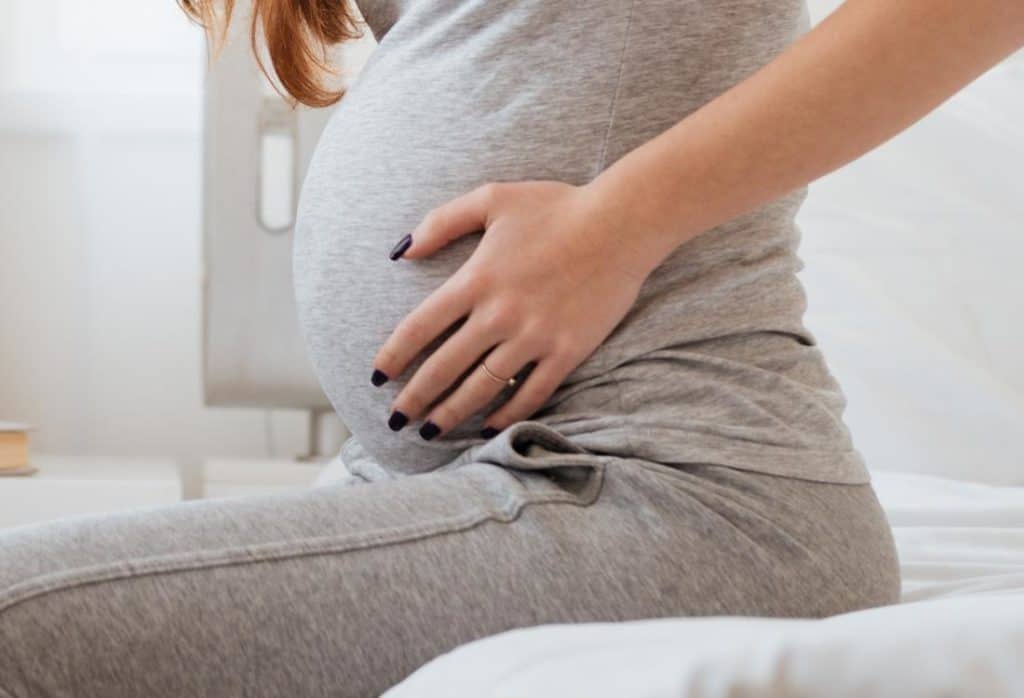
Table of Contents
Round ligament pain during pregnancy is one of the most commonly faced ordeals and if you have heard this term or are an expecting mother experiencing the agony currently, you have arrived at just the right place!
Carrying a baby is no joke; you might have heard this line a million times before you actually got pregnant but it is only after you are in the experience that you realize how much truth the statement holds. Pregnancy opens your body to a whole new range of sensations as it internally begins to make room for your baby. The said range of sensations, truth be told, more often than not, are uncomfortable, to say the least. One of these most infamous sensations, on that note, is round ligament pain; also one of the most common symptoms of pregnancy.
So, what really is Round Ligament Pain ?
Before we get to understand the pain, let’s understand ‘round ligament.’ Round Ligament can be referred to as a ropey band of tissues—imagine a thick rope—that connects the uterus to the groin area.
As the baby grows and the stomach expands, these round ligaments also stretch upwards from the groin area into the abdomen and hip areas. This ‘stretch’ causes the round ligaments to become tighter and thus causing the infamous ‘Round Ligament Pain.’
How Severe is Round Ligament Pain and when does it start ?
To put it out there very honestly, round ligament pain can sure be rather agonizing, but again, the intensity varies from woman to woman. It is felt as a sharp, sudden, piercing pain in the lower belly, hips, or groin area.
The intensity and severity of round ligament pain are also highly dependent on the growth of the baby; as the baby grows, the ligaments become more stretched or strained and the pain thereby increases. Typically, round ligament pain starts anywhere between the 16th-20th week of pregnancy, i.e. in the second trimester when the uterus outgrows the pelvis and pushes up into the abdomen.
Round ligament pain is also commonly associated with the baby bump; as the bump grows, the pain onsets. However, this might not be completely true since the bump might show sooner for moms who have already had a baby before.
How Long Does Round Ligament Pain Last ?
The intense sharp or piercing pain associated with round ligament pain actually does not last for more than a few seconds at a time; however, since it results in overworked ligaments, you might feel the residual ache for long hours.
In most cases, the pain ends with the second trimester, however, it might be influenced by various factors that might have it continue in the third trimester as well.
Identification of round ligament pain: What are the symptoms of round ligament pain ?
Pregnancy is a sum total of multiple aches and pains which might make it difficult to identify round ligament pain. To help you through his, here are some typical symptoms to help identify round ligament pain-
- The pain is never constant and comes and goes in waves
- Sharp, piercing pain felt when you abruptly change positions (like, for example, sudden standing up)
- Shooting pain in the lower abdomen (as the round ligaments stretch from the groin area up to the belly and hips)
Difficulty in carrying out your regular physical activities like walking or bending might also lead to distress and pain This is because the extended ligaments need to bear more stress when you’re moving around causing the ache
When should you consult a doctor for round ligament pain ?
Round ligament pain, though common, should not be ignored if it gets too severe. If you already have rested enough and the achiness does not seem to go away, and in turn, only becomes more severe, it might be the time to reach out to your doctor.
Here are some indications that might mean you need professional attention and care-
- Unbearable pain and cramping
- Randomly occurring fever or chills
- Bleeding (of any degree)
- Painful urination
- Unusual vaginal discharge
- Lightheadedness or constant dizziness
- Contractions
How to ease the discomfort caused by Round Ligament Pain ?
Round ligament pain is one of the most commonly occurring and experienced pain during pregnancy, however, it does not mean you should not seek relief from it. Here are some ways to ease your discomfort from round ligament pain-
- Accept that you are not just you anymore
As a pregnant woman, a lot of things change inside you and you are not just alone anymore. Since you are responsible for nourishing a life inside you, you should begin to take things easy and fight too hard to stick to your pre-pregnancy routines. For example, if you used to work out for an hour each day prior to conception, you might have to change your ways and instead take up lighter exercises like yoga or swimming. It is best to speak to your doctor and let them recommend what could work best for you and the baby. - Do not change positions to quickly. Take a minute before sitting down or getting up and do not indulge in brisk, sudden, or abrupt movements
Gentle stretching as involved in prenatal yoga might also help relieve the pain (but remember to not overdo the exercises as mentioned in point 1) - Belly belts might also help relieve some pain. (Pregnancy belly belts are worn under the belly to help support your bump)
- Warm (and not hot) showers can also help relieve round ligament pain as warmth relaxes the constrained muscles in the body
- You might also want to consult your doctor and resort to a safe painkiller like Tylenol for round ligament pain relief
Beyond and above anything else, always remember that pregnancy is the time to take care of yourself – if you do not take care of yourself, there is no way you can nourish your baby and that defies the goal of a healthy pregnancy. Sit back, unwind, and take some time off better cope with pregnancy aches including round ligament pain. For everything else, never hesitate to reach out to your doctor.
Round Ligament Pain During Pregnancy FAQs
1. Does Round ligament pain feel like period cramps ?
2. Does a belly band help with round ligament pain ?
3. Is it okay to sleep in a belly band or maternity support belt for relief from round ligament pain ?
Reviewed By:

Esha Chainani - Obstetrician and Gynaecologist
Dr. Esha Chainani is an Obstetrician, Gynaecologist, and laparoscopic surgeon who aims to break the stigma around women’s health by advocating an inclusive and open practice of obstetrics and gynecology and an author of several internationally published research papers and health articles in the media like the Swaddle.
She also founded Premaa, a non-profit to reduce maternal morbidity and eventual maternal mortality by providing lower-income pregnant women living in urban areas with cell phone access through an app that can feature an entire section about contraception as well for a whole gamut of reproductive health.
A panel for multiple health sessions including with the UN, USAID, BMC, gender at work, and multiple non-profit organisations, and is on the advisory panel of the South Indian medical students association.





